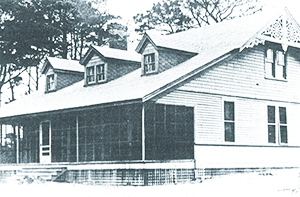Information for the following article was drawn from the resources of the Eastern Shore Room, soon to be expanded into the Eastern Shore of Virginia Heritage Center within the ESVA Regional Library to be built in Parksley.
By Curtis Badger
Special to the Eastern Shore Post
Most American presidents have had a retreat, a place where they could temporarily escape the insanity of Washington for a few days. Presidents since Franklin Roosevelt have used Camp David, a wooded park in the Catoctin Mountains northwest of D.C. Ronald Reagan had his Rancho del Cielo in California, which became known as the Western White House. Other presidents prefer glitzy golfing resorts.
Grover Cleveland was a hunter and fisherman, and one of his favorite retreats was here on the Eastern Shore of Virginia. Cleveland is the only president to serve two nonconsecutive terms. Shortly after being elected to the second term in November 1892, Cleveland and his entourage took the N.Y.P.&N. (New York, Philadelphia and Norfolk Rail-way) overnighter to Exmore, and from there traveled to Hog Island where the president-elect relaxed with friends at the Broadwater Club and spent two weeks duck hunting.
The trip attracted national media attention, and it might have been the first time a duck hunt was covered by the Associated Press. A November 30, 1892, dispatch described the scene this way: “Broadwater Inlet rang from shore to shore today with the continuous reports of shotguns, as Grover Cleveland and his fellow sportsmen from the Broadwater Club fired at the enormous flocks of wild duck and brant which wheeled about in surprise and terror, only to be met by renewed volleys of death-dealing shot from another direction.”
Cleveland stayed in a cottage owned by Joseph L. Ferrell, an executive with the New York, Philadelphia and Norfolk Railway, who was president of the Broadwater Club. The president elect’s lengthy stay on a remote barrier island would be unheard of today. He communicated only through daily dispatches that were ferried back and forth by boat to the mainland, and although the media reported extensively on his hunts, members of the press were required to stay on the mainland in Exmore, not on the island. Cleveland refused all requests for interviews while on the island, but he conversed amiably with local residents.
Cleveland did have one unexpected surprise during his visit. On Dec. 1, when returning to the Ferrell Cottage after a day in the duck blind, the president elect found Northampton County Sheriff Samuel Jarvis waiting for him. After cordially greeting the sheriff, Cleveland was handed a summons in chancery brought by a group from Richmond. According to an Associated Press report, Cleveland examined the papers and exclaimed “I’ve been sued.”
Cleveland asked Sheriff Jarvis if he could provide further details. “I cannot, sir,” he replied. “All that I know is that these papers came to me in the mail from Richmond yesterday and it was my duty to serve them.”
Cleveland’s encounter with the sheriff must not have created any negative feelings toward Hog Island or the Broadwater Club because a few months later he returned as president, this time for a fishing trip. Cleveland came to the island on May 30, 1883, with his aide, L. Clarke Davis, a member of the Broadwater Club, and this time he stayed for a week. According to newspaper reports, on the first day, the president’s party caught about 150 fish, most of which were large bluefish. On the second day, rough seas kept the party on land and they spent the morning shooting “snipe, curlews, and other beach birds.” By mid-afternoon the winds had dropped off, so the party went fishing, landing 10 large black drum, among other fish.
Regarding the court summons delivered to the president by Sheriff Jarvis, it turns out that Cleveland was not being sued after all. He was summoned to testify in regard to a real estate transaction.
You can read more about President Cleveland’s visits to the Eastern Shore in Countryside Transformed (eshore. iath.virginia.edu), a website maintained by the Eastern Shore Public Library and that will be a resource in the planned Eastern Shore of Virginia Heritage Center. You can learn more about Hog Island and the Broadwater Club in the library’s local history collection and at the Barrier Islands Center in Machipongo.
A campaign is underway to fund the new ESVA Heritage Center, which will require specialized architectural design, environmental controls, and equipment. Those wishing to donate or to be recognized with other Founders of the Heritage Center should send do-nations to ESPL Foundation, P.O. Box 554, Accomac, VA 23301, call 757-787-2500, or visit www.shorelibrary.com
Sign in
Welcome! Log into your account
Forgot your password? Get help
Password recovery
Recover your password
A password will be e-mailed to you.



